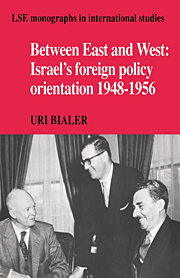Book contents
- Frontmatter
- Contents
- Acknowledgments
- INTRODUCTION
- Part I THE INTERNAL DIMENSION
- Part II RED STAR OVER ZION
- 3 “LET MY PEOPLE GO”
- 4 THE ALIYAH TIE WITH MOSCOW
- 5 THE EASTERN EUROPEAN ARENA
- 6 TRADE WITH THE SOVIET UNION
- 7 POLITICAL COOPERATION
- 8 THE MILITARY DIMENSION
- Part III THE WESTERN CONNECTION
- EPILOGUE: “A people that dwells alone”?
- Appendix 1 U.N. voting record
- Appendix 2 Biographical notes
- Appendix 3 Israel's votes at the U.N.
- Index
- LSE MONOGRAPHS IN INTERNATIONAL STUDIES
4 - THE ALIYAH TIE WITH MOSCOW
Published online by Cambridge University Press: 24 November 2009
- Frontmatter
- Contents
- Acknowledgments
- INTRODUCTION
- Part I THE INTERNAL DIMENSION
- Part II RED STAR OVER ZION
- 3 “LET MY PEOPLE GO”
- 4 THE ALIYAH TIE WITH MOSCOW
- 5 THE EASTERN EUROPEAN ARENA
- 6 TRADE WITH THE SOVIET UNION
- 7 POLITICAL COOPERATION
- 8 THE MILITARY DIMENSION
- Part III THE WESTERN CONNECTION
- EPILOGUE: “A people that dwells alone”?
- Appendix 1 U.N. voting record
- Appendix 2 Biographical notes
- Appendix 3 Israel's votes at the U.N.
- Index
- LSE MONOGRAPHS IN INTERNATIONAL STUDIES
Summary
In their studies of the period, Sovietologists have long surmised that the U.S.S.R. assisted Jewish emigration from the Eastern bloc after the Second World War in order to achieve her own objectives in Palestine. Prior to November 1947 Soviet support of aliyah was directed primarily towards exerting pressure on the Western powers to find a solution to the problem of Palestine; thus, she encouraged the emigration of Jewish refugees to Western and Southern Europe in order to cause embarrassment to Britain in the Middle East. After the U.N. accepted the Palestine Partition Plan that month, and especially from mid-1948 onward, the Soviets advocated the entry of the largest possible number of Jews in order to ease this first and most critical test of Israel's survival. The U.S.S.R. apparently anticipated the Israeli military victories which would ensure that Britain would not return to the land from which she had been ousted. The most striking example of Soviet activity thus motivated is to be found in the case of Poland: Russia permitted a large number of Polish Jews who had reached the U.S.S.R. during the course of the Second World War to return to Poland, whence their aliyah to Israel was facilitated. Before this process began, in the summer of 1945, some 50,000 Jews still lived in Poland; a year later some 150,000 left the country, for Germany and Austria. In 1947, 90,000 Jews remained in Poland. Thus, of the 250,000 to 300,000 Polish Jews resident in the U.S.S.R at the end of the Second World War, some 200,000 were permitted to return to their homeland (partly for internal Russian reasons too).
- Type
- Chapter
- Information
- Between East and WestIsrael's Foreign Policy Orientation 1948–1956, pp. 68 - 77Publisher: Cambridge University PressPrint publication year: 1990



